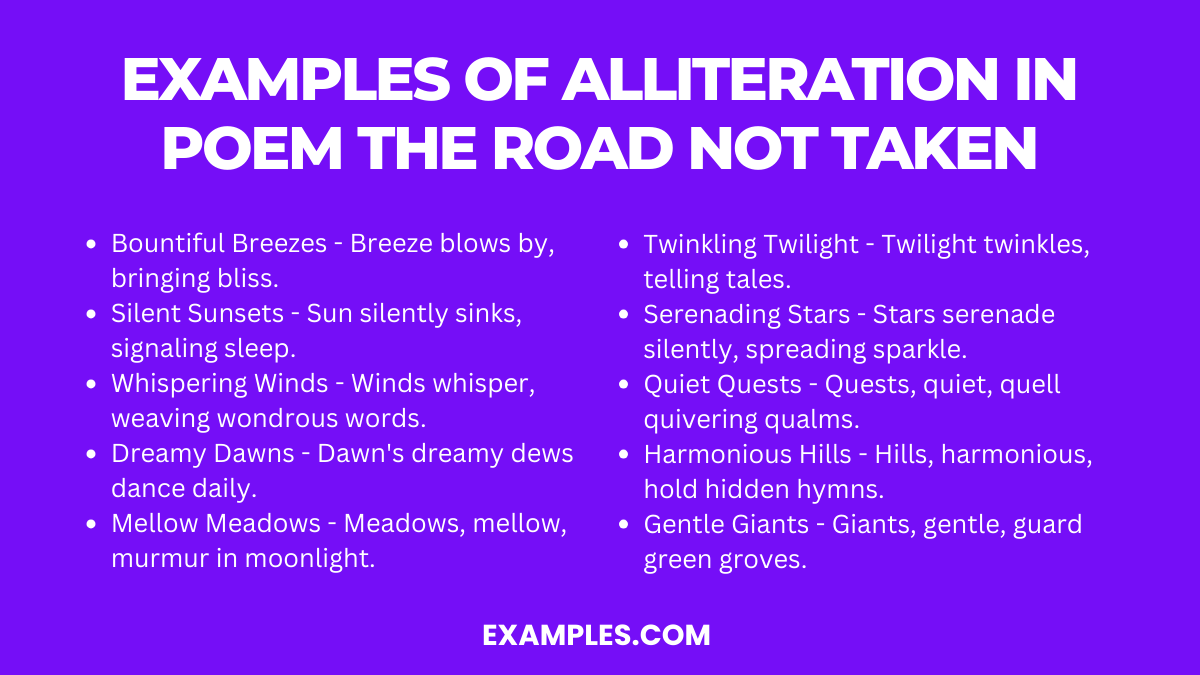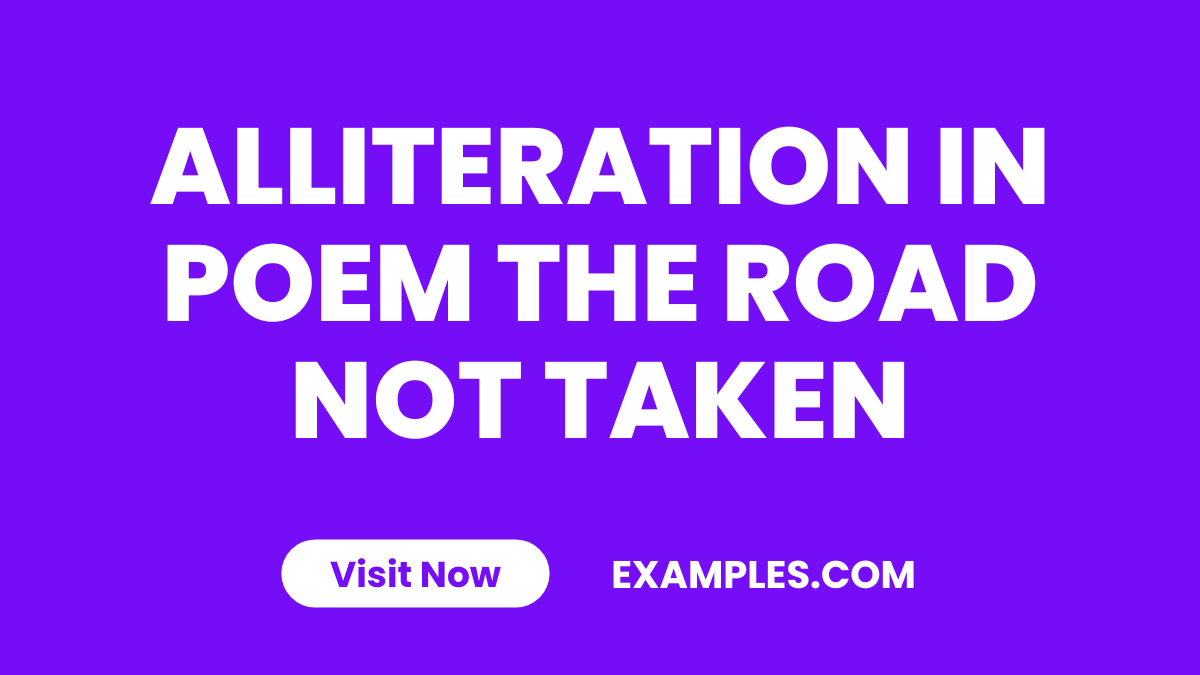49+ Alliteration in Poem The Road Not Taken Examples
Delving into the world of poetry, “The Road Not Taken” by Robert Frost stands as a beacon of literary artistry, especially in its use of alliteration. This poetic technique enhances the rhythm and musicality of the poem, creating a memorable reading experience. In this exploration, we uncover the subtleties of alliteration within this iconic poem, offering insights and tips for aspiring poets to weave similar magic in their works.
Download Alliteration in Poem The Road Not Taken PDF
Download Full Poem The Road Not Taken PDF
What is the Best Example of Alliteration in “The Road Not Taken”

One of the most striking examples of alliteration in “The Road Not Taken” is found in the line: “Where wanted wear had worn them really about the same.” This line masterfully uses the ‘w’ sound to emphasize the poem’s contemplative mood.
Examples of Alliteration in Poem The Road Not Taken

Robert Frost’s poem “The Road Not Taken” is renowned for its reflective and contemplative tone. It subtly incorporates alliteration, a literary device where consecutive words in a phrase begin with the same consonant sound, enhancing its rhythmic quality and emphasizing key elements of the poem.
- Bountiful Breezes – Breeze blows by, bringing bliss.
- Silent Sunsets – Sun silently sinks, signaling sleep.
- Whispering Winds – Winds whisper, weaving wondrous words.
- Dreamy Dawns – Dawn’s dreamy dews dance daily.
- Mellow Meadows – Meadows, mellow, murmur in moonlight.
- Twinkling Twilight – Twilight twinkles, telling tales.
- Serenading Stars – Stars serenade silently, spreading sparkle.
- Quiet Quests – Quests, quiet, quell quivering qualms.
- Harmonious Hills – Hills, harmonious, hold hidden hymns.
- Gentle Giants – Giants, gentle, guard green groves.
- Lingering Lakes – Lakes linger, lapping lands lazily.
- Mystic Mountains – Mountains, mystic, mask moonlit mysteries.
- Velvet Valleys – Valleys, velvet, voice vibrant vistas.
- Flickering Flames – Flames flicker, forming fleeting fantasies.
- Rustling Rivers – Rivers rustle, racing rapidly.
- Glistening Glades – Glades glisten, greeting golden gleams.
- Prancing Pines – Pines prance, painting peaceful panoramas.
- Dancing Daisies – Daisies dance, dazzling during dawn.
- Chirping Chorus – Chorus chirps, chimes cheerfully.
- Babbling Brooks – Brooks babble, blending backdrops beautifully.
- Wandering Woods – Woods wander, whispering wise words.
- Fluttering Flowers – Flowers flutter, flaunting flamboyant flair.
- Soaring Sparrows – Sparrows soar, singing softly.
- Whirling Whispers – Whispers whirl, weaving wistful wishes.
- Laughing Leaves – Leaves laugh, leaping lightly.
- Beckoning Beaches – Beaches beckon, basking by brine.
- Cascading Creeks – Creeks cascade, carving courses calmly.
- Dazzling Dewdrops – Dewdrops dazzle, dotting dawn’s drapery.
- Echoing Echos – Echoes echo, endlessly enchanting.
- Roaming Roses – Roses roam, radiating romance.
- Forked Forests – Forests fork, forming faint footpaths.
- Divergent Dreams – Dreams diverge, deepening dense dilemmas.
- Pathway’s Promise – Pathway’s promise, partially perceived.
- Road’s Riddle – Road’s riddle, rarely resolved.
- Choice’s Challenge – Challenge of choice, churning contemplation.
- Journey’s Juxtaposition – Journey’s juxtaposition, jarringly juxtaposed.
- Decision’s Depth – Decision’s depth, dauntingly deep.
- Traveler’s Tale – Traveler’s tale, telling two trails.
- Wayfarer’s Worry – Wayfarer’s worry, weighing worth.
- Path’s Paradox – Path’s paradox, puzzlingly profound.
- Ways Winding – Ways winding, wildly whispering.
- Leaves’ Language – Leaves’ language, lightly lingering.
- Yellow Yonder – Yellow yonder, yearning yesteryears.
- Bent Byways – Bent byways, beckoning bravely.
- Grassy Gait – Grassy gait, gently guiding.
- Trodden Tracks – Trodden tracks, telling tales.
- Sighed Sojourns – Sighed sojourns, subtly spoken.
- Doubt’s Dance – Doubt’s dance, delicately daunting.
- Morning’s Murmur – Morning’s murmur, musingly meanders.
- Traveler’s Thought – Traveler’s thought, thoroughly thrumming.
What is the Real Meaning of The Road Not Taken?
“The Road Not Taken,” one of Robert Frost’s most famous poems, is often interpreted as a celebration of individualism and non-conformity. However, its real meaning is more complex. Frost presents a narrative of a traveler facing a choice between two paths in a wood, symbolizing life’s decisions. The poem’s deeper meaning lies in its reflection on the nature of choice and its consequences. The speaker’s decision is made with a sigh, suggesting a sense of uncertainty and contemplation rather than outright defiance or non-conformity. It explores the human tendency to attribute profound significance to choices made, often in retrospect, and how these choices shape our identity and life story.
What is the Main Point of The Road Not Taken?
The main point of “The Road Not Taken” is the inevitability of choice in life and the unavoidable reality that our choices shape our journey. Frost uses the metaphor of a diverging path to represent life’s choices and their irreversible nature. The poem emphasizes the significance of decisions, even seemingly trivial ones, in determining the course of one’s life. It also reflects on how people often romanticize the choices they make, lending them greater significance in hindsight. The poem is a contemplative piece on the human experience of decision-making and its lasting impact.
What’s the Message of The Road Not Taken?
The message of “The Road Not Taken” revolves around the themes of choice, individuality, and the unknown. Frost communicates that every choice entails a sacrifice – the path not taken. The poem encourages readers to accept the ambiguity and uncertainty inherent in decision-making. It also suggests that the uniqueness of one’s life journey is defined by the choices one makes, even if the outcomes of these choices are unknown at the time. The poem does not necessarily advocate for choosing the less traveled path but rather acknowledges the complexity and significance of every decision.
What was Robert Frost’s Famous Quote on The Road Not Taken?
One of Robert Frost’s most famous quotes regarding “The Road Not Taken” comes from a letter he wrote to a friend, where he explained that the poem was a bit of a jest. He said, “You have to be careful of that one; it’s a tricky poem — very tricky.” This quote reveals Frost’s perspective on the poem, suggesting that it should not be taken at face value. The poem’s popularity and frequent interpretation as a straightforward celebration of individualism and non-conformity might be misleading, as Frost himself acknowledged its subtle and ironic complexities.
In conclusion, the use of alliteration in “The Road Not Taken” by Robert Frost adds a rhythmic charm and deepens thematic resonance. When writing alliteration, focus on consonant sounds that enhance the poem’s mood and imagery. Tips include choosing words that reflect the poem’s tone, practicing moderation to avoid overuse, and ensuring that alliteration serves to strengthen, not distract from, the poem’s message.


